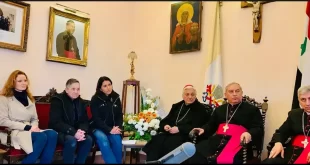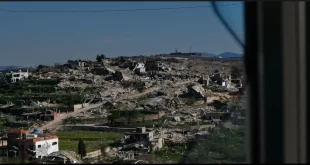November 3, 2017, Investig’action

In early 2003 it was claimed that Iraq was a threat to other countries. Despite ten years of crushing economic sanctions plus intrusive inspections, supposedly Iraq had acquired enough “weapons of mass destruction” to threaten the West. It was ridiculous on its face but few people in power said so. Establishment politicians and media across the U.S. promoted the idea. In the Senate, Joe Biden chaired the committee looking into the allegations but excluded knowledgeable critics such as Scott Ritter. This led to the invasion of Iraq.
Today we have something similarly ridiculous and dangerous. Supposedly the Syrian government decided to use a banned chemical weapon which they gave up in 2013-2014. Despite advancing against the insurgents, the Syrian government supposedly put sarin in a Russian chemical weapon canister and dropped this on the town Khan Shaykhun which has been under the control of Syria’s version of Al Qaeda for years. To top off the stupidity, they left paint markings on the canister which identify it as a chemical weapon.
Supposedly the Syrian government did this despite knowing there are many “White Helmet” activists in the town along with with their cameras, videos, computers, internet uplinks and western social media promoters. Supposedly the Syrian government did this despite knowing that neo-conservatives, neo-liberals and zionists are keen to prolong the conflict and drag the US and NATO into it. Supposedly the Syrian government did this despite knowing the one thing that could trigger direct US aggression in the conflict is the use of chemical weapons …. the “red line” laid down by Barack Obama.
If the above sounds unlikely, it is. But even if these accusations should be laughed out of the room, as they should have been in 2002, let’s take the claims about the event at Khan Shaykun in Syria on 4 April 2017 seriously. Certainly the consequences will be serious if the trend is not reversed.
What Happened at Khan Shaykhun?
The report titled “Seventh report of the OPCW-UN Joint Investigative Mechanism” was provided to select governments and media on Thursday 26 October. Media announced the key finding without criticism or question. They highlighted the sentence that the committee is “confident that the Syrian Arab Republic is responsible for the release of sarin in Khan Shaykhun on 4 April 2017”.
About 36 hours later, the report was leaked via the internet. But the die was already cast as establishment media had “confirmed” Syrian guilt.
Following are key contradictions and inconsistencies in the report produced by the Joint Investigative Mechanism of the UN and Organization for the Prohibition of Chemical Weapons (OPCW).
The investigation ignores the essential element of motive
The three essentials in criminal investigation are Motive, Means and Opportunity. All three must be present. Yet the investigation team ignores the question of motive. The Syrian government has every motive to NOT use proscribed weapons.
On the other side, the armed opposition has a strong motive to implicate the Syrian government. They have been calling for US and NATO intervention for years. They are losing ground, recruits and allies. Yet these facts are never considered.
The investigation relies primarily on biased sources
On page 1 the Joint Investigative Mechanism claims they have conducted a “rigorous independent examination”. But most experts and witnesses are biased toward the “regime change” policies of western governments.
On page 4 the report says“The Mechanism engaged several internationally recognized forensic and specialist defense institutes… to provide forensic and expert support to the investigation.”
Any “defense institute” connected or contracting with France, UK or USA will have inherent assumptions and bias since these governments have actively promoted overthrow of the Syrian government.
The investigation ignores credible but critical analyses
The Joint Investigative Mechanism (JIM) team makes no mention of the published analysis and findings of numerous researchers, investigative journalists and scientists. For example:
– MIT Professor Theodore Postol has analyzed the Khan Shaykhun incident. He persuasively challenges the main theory about the crater site and munition.
– American investigative journalist Seymour Hersh has also written about he incident. His information from U.S. military and intelligence officers reveal that the American military knew about the forthcoming attack in advance. He reports the Syrian jet attack was “not a chemical weapons strike …. That’s a fairy tale.”
– Investigative journalist Gareth Porter has written an expose titled “Have We Been Deceived over Syrian Sarin Attack? Scrutinizing the Evidence in an Incident Trump Used to Justify Bombing Syria”.Porter presents a devastating critique of the sarin-crater theory. He documents how easily false positives for sarin could have been created and how the OPCW has violated their own investigation protocols.
– Researcher Adam Larson has written an expose titled “Syria Sarin Allegation: How the UN-Panel Report Twists and Omits Evidence”. After closely inspecting the photographs and videos, he questions whether the victims are civilians kidnapped from a nearby village five days previously. Larson’s site “A Closer Look at Syria” has a good index of videos and articles on this and other events.
The above “open source” analysis and information was published well before the current report but apparently not considered. A “rigorous, independent examination” needs to evaluate investigations such as these.
Victims appear before the attack
On pages 28-29 it is reported that “Certain irregularities were observed in elements of information analyzed. For example, several hospitals appeared to start admitting casualties of the attack between 06’40 and 06’45 hours…. in 57 cases patients were admitted in five hospitals before the incident in Khan Shaykhun….in 10 such cases, patients appear to have been admitted to a hospital 125 km away from Khan Shaykhun at 07’00 hours while another 42 patients appear to have been admitted to a hospital 30 km away at 07’00 hours.”
It is reported that “The Mechanism did not investigate these discrepancies and cannot determine whether they are linked to any possible staging scenario, or to poor record-keeping in chaotic conditions”.
Given the importance of determining whether this incident was caused by the Syrian government or staged by elements of the armed opposition and their supporters, why were these discrepancies not investigated further?
Clearly it is not possible that victims were transported 125 kms and delivered to a hospital in 15 minutes. This is potentially powerful evidence of a staged event.
‘White Helmets’ were warning of a chemical weapon Attack before the Attack
On page 20 it says “The Mechanism collected information from witnesses to the effect that a first warning of a possible upcoming chemical attack was received by “Syrian Civil Defense” (also known as the “White Helmets”) and spotters in Kahn Shaykun…. The witness stated that the alert advised residents to be careful as the aircraft was likely carrying toxic chemicals.”
It seems reasonable to ask: Was the advance talk of “toxic chemicals” a signal to get ready for a staged event?
How would a plane spotter know there was a one-time chemical bomb aboard? This is another area that needs more investigation.
Were Syrian planes over Khan Shaykhun at the critical time?
The basic question of whether or not there were Syrian jets over Khan Shaykhun is unanswered. The Syrian military says they did NOT fly over Khan Shaykhun in the early morning.
Page 21 documents that the Syrian pilot and log books record that the Su-22 jet was executing attacks at other nearby towns and not closer than 7 – 9 kms from Khan Shaykhun. Radar track data from the U.S. appears to support this, indicating the Syrian jet path was 5 kms from Khan Shaykun.
On page 7 it says “SAAF aircraft may have been in a position to launch aerial bombs”
On page 22 it says, “the witness reported waking up at around 0700 hours on 4 April 2017 to the sound of explosions. The witness stated that there had been no aircraft over Khan Shaykhun at the time and that aircraft had only started launching attacks at around 1100 hours.”
There are conflicting testimonies on this issue but curiously no video showing jet fighters at the time of the explosions in Khan Shaykun. It is unconfirmed how the ground explosions occurred.
The investigation team did not try to visit the scene of the crime
On page 3 the report says “The Mechanism did not visit the scenes of the incidents…. While the Leadership Panel considered that a visit to these sites would have been of value, such value would diminish over time. Further, the panel was required to weigh the security risks against the possible benefits to the investigation.”
While it is certainly appropriate to consider security, the actual scene of a crime provides unique opportunities for evidence. The OPCW has previously stated the necessity of having access to a crime site then taking and transferring samples to a certified lab with a clear chain of custody.
If the insurgents still controlling Khan Shaykhun have nothing to hide, they should welcome the investigation.
Furthermore, Russian authorities offered to guarantee the safety of the inspection team. Yet the investigation team apparently made no effort to visit the site. Why? In an investigation of this importance, with potentially huge political consequences, visiting and analyzing the scene of the crime should be a requirement if at all possible.
The material evidence come from insurgents with no verifiable chain of custody
On page 23 it says “Samples taken from the crater and its surroundings were found by the Fact Finding Mission to contain sarin.” On the day of the event, insurgents took soil samples and victims to Turkey where they were received and subsequently tested. Without verified origins and “chain of custody”, this data cannot be verified and must be considered skeptically.
As indicated in the report, one theory about the 4 April 2017 event is that it was staged to implicate the Syrian government. If that theory is correct, it is predictable that the plotters would have samples prepared in advance, including sarin samples with markers matched to the Syrian stockpile.
The Syrian sarin was destroyed aboard the US vessel “MV Cape Ray”. Given the heavy involvement of the Central Intelligence Agency in the Syrian conflict it is likely they analyzed and retained some portion.
The report repeats discredited claims about bomb fragment and filler cap
On page 26 it is reported that “two objects of interest … were the filler cap from a chemical munition and a deformed piece of metal protruding from deep within the crater. According to information obtained by the Mechanism, the filler cap, with two closure plugs, is uniquely consistent with Syrian chemical aerial bombs.”
This information may come from a Human Rights Watch report which has been discredited. The “filler cap” was supposedly a match for an external plug for a Russian chemical weapon bomb but was found to not match and to be based on a 1950’s era museum photo. An insightful and amusing critique of the HRW report is here.
The authenticity of the fragments in the crater is also challenged by the lack of a tailfin or any other bomb fragments. A chemical weapon bomb is designed to release and not burn up the chemical and therefore the munition casing should be on site.
Strange actions suggesting a staged event
On page 28 the report notes methods and procedures “that appeared either unusual or inappropriate in the circumstances.” For example they observe that a Drager X-am 7000 air monitor was shown detecting sarin when that device is not able to detect sarin, and “para-medical interventions that did not seem to make medical sense, such as performing heart compression on a patient facing the ground.”
On page 29 it is reported that one victim had blood test showing negative for sarin and urine test showing positive. This is an impossible combination. Also on page 29 it is noted that some of the rescue operations were inappropriate but might have been “attempts to inflate the gravity of the situation for depiction in the media.”
The report does not mention the video which shows “White Helmet” responders handling victims without any gloves or protection. If the patients truly died from sarin, touching the patients’ skin or clothing could be fatal. Incidents such as these support the theory that this was a contrived and staged event with real victims.
The team is “confident” in their conclusions yet basic facts are in dispute
On page 22, the report acknowledges that “To date the Mechanism has not found specific information confirming whether or not an SAA Su-22 operating from Al Shayrat airbase launched an aerial attack against Khan Shaykhun on 4 April 2017.”
How can they be “confident that the Syrian Arab Republic is responsible for the release of sarin at Khan Shaykhun on 4 April 2017” when such basics have not been confirmed?
 Syria Support Movement solidarity with the Syrian people
Syria Support Movement solidarity with the Syrian people




